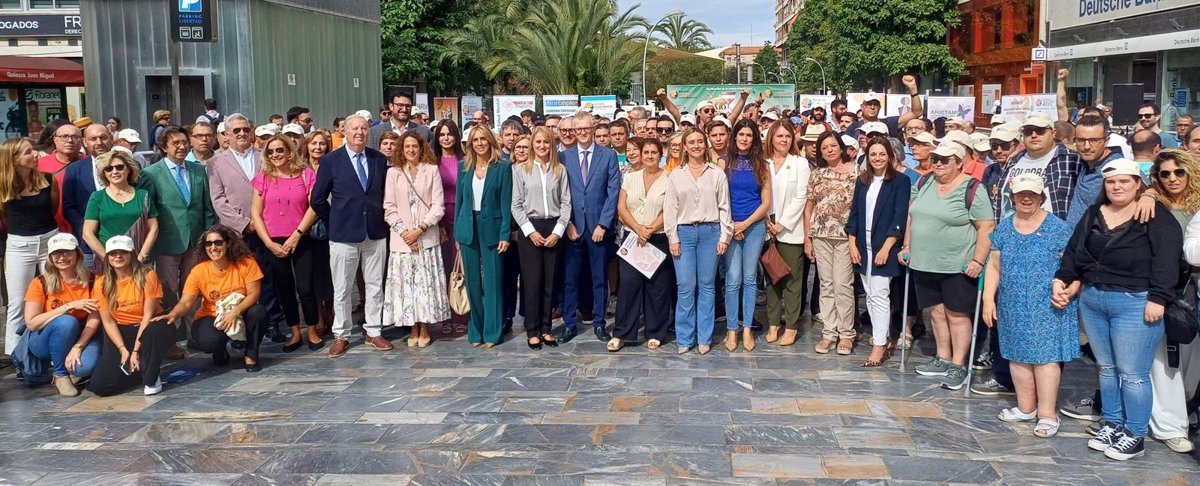MURCIA 9 Oct. (EUROPA PRESS) –
The Murcia Region Mental Health Federation has brought together the associative movement on Avenida de la Libertad in the capital to celebrate World Mental Health Day, which this year is dedicated to the importance that employment has for people with health problems. mental health, as well as throughout society, under the motto ‘Work and Mental Health, a fundamental link’.
The event, which brought together more than 300 people, has claimed the importance of decent work in mental health and how low salaries, temporary employment, lack of conciliation, work rhythms or the wage gap can impact well-being of the worker, according to sources from the organization in a statement.
The organizers also wanted to make visible the discrimination that affects people with mental health problems in the workplace, and have demanded social and structural change to eradicate the stigma.
The president of the Murcia Region Mental Health Federation, Pilar Morales, recalled that in Spain mental health problems are the second cause of sick leave, only behind musculoskeletal problems. Specifically, almost 600,000 casualties are recorded in 2023, 15% more than the previous year.
“Stigma continues to be a reality in the work environment, since 54% of people on mental health leave have hidden the real reason for their absence,” concluded the president of the mental health association movement in the Region of Murcia.
PRECARIOUSNESS, A HARMFUL SOCIAL DETERMINANT
According to the Report ‘Job insecurity and mental health’, prepared by the Ministry of Labor and Social Economy, job insecurity is a harmful social determinant for health, which can generate very diverse mental health problems such as anxiety and depression, which ” generate great psychological suffering and whose effects extend to all areas of life.
The same document indicates that more than half of the jobs in Spain are precarious. Furthermore, the Active Population Survey indicates that 47% of employed people report being exposed to risk factors for their mental health in their workplace.
Regarding people with mental health problems, low labor insertion is one of the main barriers to their social inclusion. This is due, to a large extent, to the social prejudices that many companies and public administrations still maintain, as explained by the Murcia Region Mental Health Federation.
The most recent data from the INE indicate that people with psychosocial disabilities had the second lowest employment rate in 2022, with 18.9%.
SPEAKER IN THE REGION OF MURCIA
The mental health associative movement in the Region that encompasses the Region of Murcia Mental Health Federation includes 17 entities that are located throughout the autonomous region, between full and adhered members, and that represent approximately 2,600 families.
All of them were present at the event that was held this Wednesday on Avenida de la Libertad to demand “more and better employment”, which is this year’s objective set by the Spanish Mental Health Confederation.
The manifesto has been read by members of mental health associations. For their part, the proclamation was carried out by the authorities present at the event, such as the delegate of the Government of Spain in the Region, Mariola Guevara, the counselors of Health and Social Policy, Juan José Pedreño and Conchita Ruiz, as well as the Councilor for Social Welfare of the Murcia City Council, Pilar Torres.
Three general directors of the regional Government, councilors of all the municipal groups of Murcia and deputies of the Regional Assembly of PP, PSOE and Vox, as well as members of the Colleges of Psychologists and Social Work, as well as representatives of third sector entities.
INNOVATIVE RECOVERY PROJECT
For his part, the Minister of Health, Juan José Pedreño, recalled that the Ministry of Health has allocated more than 122,000 euros for the employment of 13 people with serious mental disorders and addictions in the process of recovery, who will be hired by entities of the third sector over the next 12 months.
“This is an innovative recovery project that aims to transform current public mental health intervention models towards a personal recovery model, and offer those who suffer from serious mental health problems and/or addictions the ability to recover their identity and their lives, what happens through their incorporation into the labor market,” he explained.
For her part, the Minister of Social Policy has highlighted “the importance of promoting the autonomy of people with mental health problems so that they can develop an independent life and inclusion in their community environment.”
Hence, along with job placement, they also have specific services in the Community to promote personal autonomy (SEPAP) and supervised housing where they are not only offered professional support 24 hours a day, but also develop programs to improve daily living skills. The regional government allocates 4.6 million euros to these resources.
